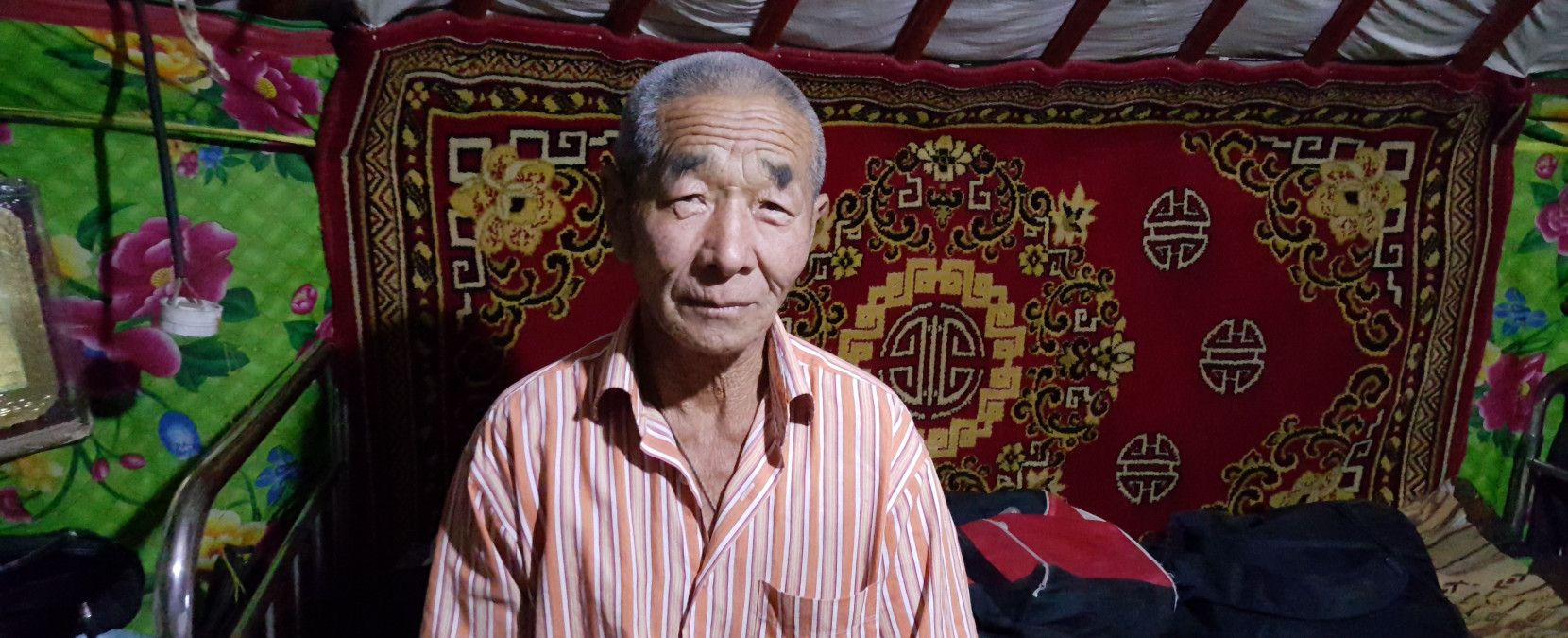Helping Mongolian Herders Get Back on Their Feet after Dzud
Published: May 27, 2019 Reading time: 5 minutes Share: Share an articleMishig lives with his wife, children, and grandchildren in the beautiful steppes of the Sukhbaatar province in Mongolia. He is one of the herders who received feed kits and unrestricted cash transfers from People in Need’s (PIN) emergency response to the 2018 dzud. He and his wife have been herders since 1975.

Dzud is a winter disaster in which deep snow, severe cold, or other conditions that render forage unavailable or inaccessible lead to high livestock mortality. This is one of the biggest issues in Mongolia because the majority of Mongolians rely on pastoral farming for their livelihood.
“Your assistance helped us a lot because the quality of the feed was very good and we fed our weakest animals with it. Also, we used the cash assistance for our son’s treatment,” says Mishig. He told us that the cash transfer helped him get more loans with a lower interest rate, which kept him from going further into debt.
Preparing Communities for Dzuds
Factors such as high rates of indebtedness, lack of dzud preparedness and understanding, lack of herd size regulation, and climate change worsen the effects of dzuds and increase their frequency. Older herders like Mishig note that climate change, lack of herd size regulation, and mining are big factors in the increasing frequency of dzuds.
“Nowadays, it is becoming very difficult to be a herder. There are many changes in the pasture and the pasture grass yield is low. Moreover, there is not as much rain,” says Mishig.
People in Need (PIN) came to Mongolia in 2009 to help the herders who were hit by the dzud. While emergency responses from NGOs such as PIN were necessary in cases like the dzuds in 2009-2010, 2015-2016, 2016-2017 and 2017-2018, implementing disaster risk reduction (DRR) plans could potentially lessen the need for such interventions.
By aiding individuals, local authorities, and communities to prepare for dzuds and other disasters, we could reduce their impact on people’s livelihoods. A call for a change on a policy level is needed as overgrazing and climate change in Mongolia are leading to land degradation.
SMS Support Services for Herders
One example of PIN’s work in disaster risk reduction is the Leveraging Technology and Tradition for Resilience in Rural Mongolia (LTT4R) project funded by the European Union Civil Protection and Humanitarian Aid Operations (ECHO). PIN, Mercy Corps and its partners created an SMS service to inform the herders of upcoming weather and pasture conditions in their region to allow them to prepare for harsh weather conditions.
“The main reason we are using this [SMS service] is because we want to know if there will be rain, dust storms or snow because weather significantly affects our herding strategy. Receiving weather information by message is very useful for us and very easy to use,” says Ulzithutag, who has been using the SMS service for about a month.
In 2018, for the third year in a row, Mongolian herders faced extreme winter conditions. According to the International Federation of Red Cross and Red Crescent Societies (IFRC), twenty out of Mongolia’s 21 provinces faced extreme winter conditions during the 2017-2018 winter. In response to this situation, Local Emergency Management Agencies (LEMA) in Sukhbaatar and Dornod issued formal requests for assistance to People in Need.
An absence of cash, market shortages and exhaustion of reserves forced the herders to look for short-term solutions: borrowing food and essential goods from shops, getting a bank loan if possible, or selling the animals for very low prices, consequently losing possible income from the cashmere, dairy and meat. People were not able to cope without immediate assistance.
Animal Feed and Cash Grants for Hundreds of Households
People in Need helped 415 households (1,478 individuals) through the provision of animal feed kits. We also provided aid to 444 households (1,529 individuals) through the unconditional cash transfer programme in 2017-2018. In 2016-2017, 592 households (2477 individuals) received feed kits, 591 households (1447) received cash in 11 soums of Dornod aimag.
Animal Feed Packages
Depending on the herd size, each household received an amount of concentrated animal feed and two packages of micronutrient and vitamin supplement. The amount of animal feed aimed to support the livestock for one month in 2017-2018 and for two months in 2016-2017.
Unconditional Cash Grants
Every household that received animal feed, and additional households that had no animals at the time of response, but were dependent on herding for their livelihood, received an unconditional cash grant to support their early recovery and meet the basic needs of their household. The amount of the cash grants provided was based on the number of members in a household. A family with 1-2 people received 1,038 CZK (50 USD), a family with 3-5 people received 2,076 CZK (100 USD) and a family of 6 or more people received 3,114 CZK (150 USD). People in Need provided cash assistance via bank transfers and cheques.
In the winter of 2016-2017, PIN provided basic food items such as flour, tea, sugar, and rice to 2450 herder households in the Dornod and Sukhbaatar provinces for 45 days. Additionally, 735 herder households were given cash assistance of 140 000 MNT (60EUR). More information about PIN dzud relief assistance can be found HERE.
Without large-scale emergency response from the Mongolian government and supplemental financial income for herders, it is almost impossible for herders to get back on their feet after disasters such as dzuds. For the past few years, People in Need has assisted these herders during dzuds in the eastern aimags, in addition to working to reduce disaster risks by providing SMS services. Thanks to our donors and partners, People in Need has both directly and indirectly helped numerous herders to recover from hazardous winters and to prepare for future difficulties.
Donors:
Ministry of Foreign Affairs of the Czech Republic, PIN Club of Friends



